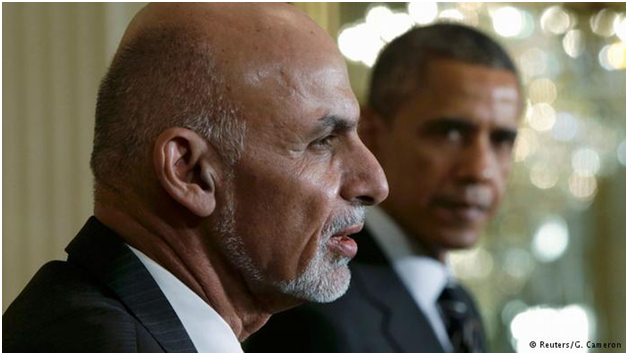Ghani Caught Between a Rock and a Hard Place
Dr Ghani in Washington

NEW DELHI: It is not easy being Afghan President Ashraf Ghani. An example of why it is not easy being Ashraf Ghani is evinced by the Afghan leader’s visit to Washington earlier this week.
As a result of the visit, US President Barack Obama announced a change in plans regarding US troop withdrawal from Afghanistan. The initial plan was to cut the number of troops to 5000 by the end of the year, and pave the way for a complete withdrawal by the end of 2016. However, Ghani needs US troops. The security situation in Afghanistan is deteriorating -- with 2014 being the worst year yet in terms of civilian casualties -- and the capability of the Afghan security forces, routinely targeted by insurgents, remains a question mark. Ghani must have breathed a huge sigh of relief as Obama declared that all 9800 troops will remain in Afghanistan till the end of 2015, after which the plan for withdrawal will be reviewed.
Happy days? Not entirely. When Ghani came to power in September last year, he quickly signalled a change in policy. Ghani soon after being sworn-in visited Pakistan, and then Pakistan’s army chief and head of intelligence visited Kabul. Afghanistan and Pakistan have for long shared a tense relationship, which had sunk to an all-time low under the presidency of former Afghan President Hamid Karzai. Karzai had been openly critical of Pakistan -- accusing the neighbouring country of supporting the Afghan Taliban and providing refuge to the group’s leadership.
Ghani, unlike his predecessor, reached out to Pakistan. Delegations from the two countries made visits across the border; six Afghan army cadets were sent to Pakistan for training; military efforts were coordinated across the shared border; and Ghani and Pakistani Prime Minister Nawaz Sharif both issued statements in support of cooperation and bilateral ties.
The shift in policy seemed to be bearing fruit, with reports circulating that the Afghan Taliban -- under pressure from Pakistan was on the verge of agreeing to talks with the Afghan leadership. This was huge. For the first time in thirteen years -- since the US invasion of Afghanistan -- the Taliban, which has thus far maintained that the Afghan government is illegitimate, was ready to initiate a peace process.
Pakistan’s support was the crucial factor in enabling talks. A report in The Express Tribune quoted an unnamed former top commander of the group saying, “Taliban officials, who had been involved in talks with the Pakistanis and the Chinese, and had sought time for consultations with the senior leaders, have received a green signal from the leadership,” adding that “Pakistani officials had advised Taliban leaders to sit face-to-face with the Afghan government and put their demands to find out a political solution to the problem.” The same report quoted another unnamed Taliban source confirming the report and adding that “a small delegation will be visiting Pakistan in days for consultations” to be able to take the discussion with the Afghan government forward.
The Washington happened. As soon as Obama announced the decision to slow troop withdrawal, the Taliban issued a statement vowing to continue fighting. "This damages all the prospects for peace, Taliban spokesman Zabihullah Mujahid said of the announcement. “This means the war will go on until they are defeated.”
And that’s that.
In fact, Ghani’s predicament -- of needing the US and wanting to begin a dialogue with the Taliban -- is reflected in a statement made by the Afghan President whilst in Washington. Ghani issued an apology -- of sorts -- to the Taliban. He said that peace with the militants was “essential” and that some Taliban members suffered legitimate grievances. "People were falsely imprisoned, people were tortured. They were tortured in private homes or private prisons," Ghani said (as reported by Reuters). “How do you tell these people that you are sorry?" he added.
Clearly, it is not easy being Ashraf Ghani. This is further proven by the fact that Ghani’s policies have been outrightly criticized. His decision to reapproach ties with Pakistan has especially come under criticism. In an interview with The Guardian, former Afghan President Hamid Karzai -- said that the country’s historic struggles against British imperialism and Soviet invasion will have been in vain if it succumbs to pressure from Pakistan.
This view was echoed by Karzai’s associates who sat in on the interview. Rangin Dadfar Spanta, a former foreign minister and national security adviser said that the policy amounts to the humiliating “appeasement” of a hostile power who would never change its ways. In a similar vein, Omar Daudzai, one of the most influential officials of the Karzai era who served as chief of staff and interior minister, predicts, “There could be a bloody summer, there will be fighting and there will be disappointments on the dialogue table from time to time.” Daudzai, a former ambassador to Islamabad, added that whilst he thought Ghani’s attempts to woo Pakistan were “courageous,” they would ultimately fail to change the country’s behaviour. “He has taken controversial steps that his predecessor didn’t take, and now we have to wait to see whether the Pakistani side is sincere or not,” he said. “But I am far more sceptical than I ever was before about Pakistan’s sincerity.”
And this is by no means an isolated view. An important figure within Afghanistan, Karzai echoes a distrust that runs deep with the Afghan people. Ghani, therefore, will inevitably -- sooner rather than later -- begin to face pressure in showing that his policy of translating into results beneficial to Afghanistan.
One such key result was the dialogue process with the Taliban. However, Afghanistan’s dependence on the US -- financially and militarily -- seems to be entirely incompatible with the same.
As said, it is not easy being Ashraf Ghani.



